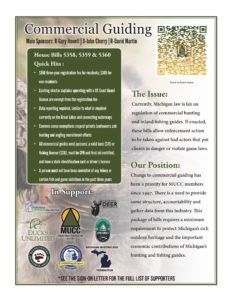MUCC Policy Priority: Commercial Guiding Legislation Passes House Committee
MUCC has prepared a call to action on this legislation urging our membership to contact their legislator and ensure they will be supporting this much needed legislation on the floor of the house. The call to action form can be found here. If you would prefer to call your representative or contact them via other means, use this tool here.
A package of legislation that provides a critical framework for the commercial guiding industry in Michigan and helps inform management decisions passed out of committee unanimously Thursday.
Sponsored by Representatives Gary Howell (R-North Branch), John Cherry (D-Flint), and David Martin (R-Davison), HBs 5358 , 5359 , and 5360 would prevent poachers and other bad actors from posing as legitimate guides, while also providing new critical tools to law enforcement and biologists alike.
This package of bills requires a low threshold to protect Michigan’s rich outdoor heritage and the important economic contributions of Michigan’s hunting and fishing guides. A base hunting license or fishing license, first aid and CPR certifications, a clean record without poaching violations or felonies, and $150 fee for three years is a relatively low barrier of entry for one to achieve.
MUCC Executive Director Amy Trotter said the organization and much of the greater conservation community remains steadfast in its support for this legislation.
“This legislation carries nearly universal support from the hunting and angling community. While this legislation has changed a bit over the years, MUCC believes it is in a good position, and long past due.” Trotter said, “Thank you to the bill sponsors and this committee for showing their unanimous support for protecting Michigan’s hunters, anglers, and natural res ources.”
Michigan United Conservation Clubs (MUCC) first passed a resolution detailing the need for oversight in 1997, and the current legislation has been in the works for the better part of a decade.
Howell, the natural resources committee chair, said conservation, hunting and angling organizations have championed this issue throughout several legislative sessions.
“With nearly universal support in the greater conservation community, most agree there is a need to provide a basic framework for commercial guides,” Howell said. “I thank my colleagues for providing their unanimous bipartisan support to bring these bills out of committee. We now move on to the entire House of Representatives for a floor vote.”
The important tools our biologists gain from this legislation will help inform future conservation decisions, said Rep. Cherry, co-sponsor of the package.
“Guides and outfitters are oftentimes the eyes and ears in the field for our natural resources,” Cherry said. “Data reporting will ensure what they are seeing on the ground is being recorded to help inform future management decisions.”
MUCC has prepared a call to action on this legislation urging our membership to contact their legislator and ensure they will be supporting this much needed legislation on the floor of the house. The call to action form can be found here. If you would prefer to call your representative, or contact them via other means use this tool here.
To ensure our natural resources remain protected and managed thoughtfully in perpetuity, join Michigan United Conservation Clubs today: http://bit.ly/JoinMUCC
The post MUCC Policy Priority: Commercial Guiding Legislation Passes House Committee appeared first on Michigan United Conservation Clubs.
Recent Posts




